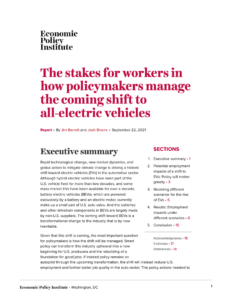Full Title: The Stakes for Workers in How Policymakers Manage the Coming Shift to All-Electric Vehicles
Author(s): Jim Barrett, Josh Bivens
Publisher(s): Economic Policy Institute
Publication Date: September 22, 2021
Full Text: Download Resource
Description (excerpt):
Rapid technological change, new market dynamics, and global action to mitigate climate change is driving a historic shift toward electric vehicles (EVs) in the automotive sector. Although hybrid electric vehicles have been part of the U.S. vehicle fleet for more than two decades, and some mass-market EVs have been available for over a decade, battery electric vehicles (BEVs), which are powered exclusively by a battery and an electric motor, currently make up a small part of U.S. auto sales. And the batteries and other drivetrain components in BEVs are largely made by non-U.S. suppliers. The coming shift toward BEVs is a transformational change to the industry that is by now inevitable.
Given that this shift is coming, the most important question for policymakers is how the shift will be managed. Smart policy can transform this industry upheaval into a new beginning for U.S. producers and the rebuilding of a foundation for good jobs. If instead policy remains on autopilot through the upcoming transformation, the shift will instead reduce U.S. employment and further batter job quality in the auto sector. The policy actions needed to boost job quality and employment in the auto sector in coming years are not radical. Instead, they are commonsense measures like ensuring that any taxpayer subsidies or rebates to incentivize auto purchases come attached with specific requirements on labor standards in the industry, and with measures to boost investment in domestic auto capacity of U.S. producers and suppliers. If policymakers pass such commonsense measures, the U.S. can regain leadership in auto production in coming decades, and the benefits of this leadership will accrue to workers in the industry.
This report lays out the stakes involved. We report on the likely employment and job-quality implications of a large-scale shift to BEVs under various scenarios that are shaped by policy. By policy, we refer to measures to strengthen U.S. leadership in BEV production, including providing manufacturing incentives to onshore investments, enhancing the share of BEV drivetrain components that are produced domestically, securing and strengthening advanced manufacturing capacity, and crafting better trade agreements with more reliable enforcement measures.
